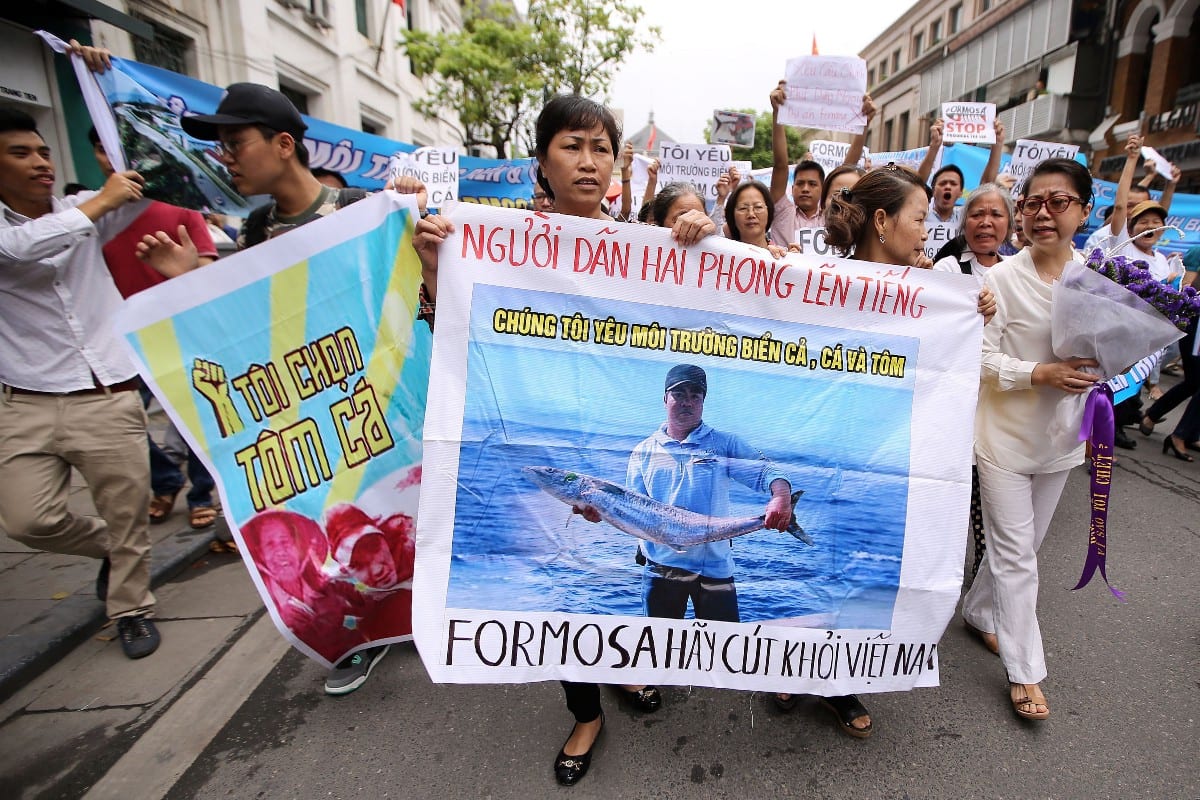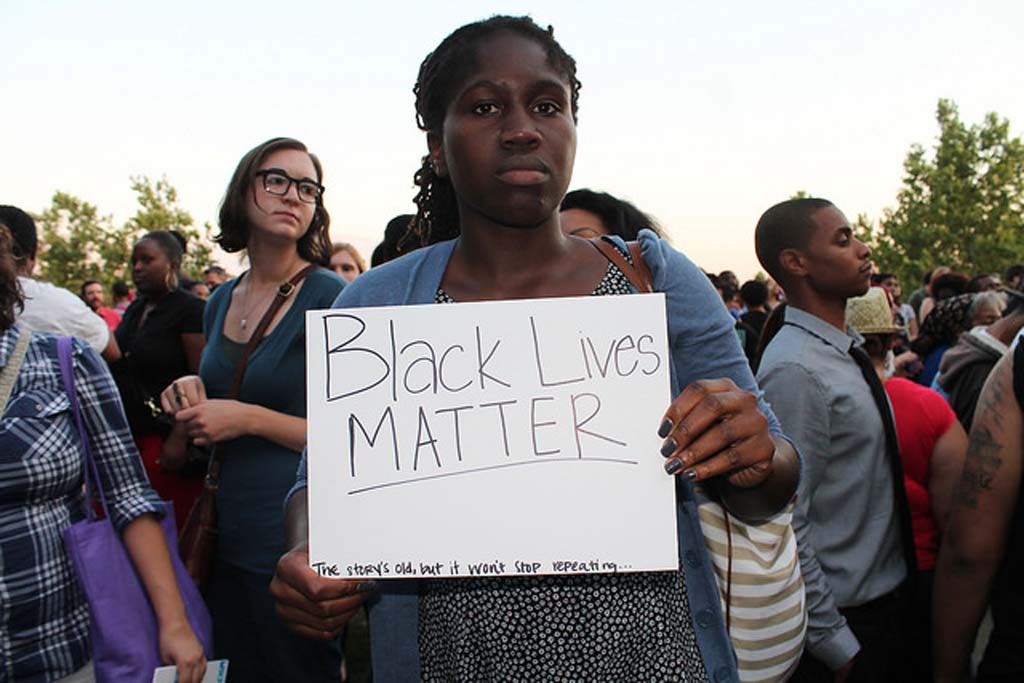On April 6th in Ha Tinh, Vietnam, a central province made up mostly of coastline and fishing boats, dead fish began washing ashore. The stink and the carcasses continued to arrive, eventually claiming 200km of beach and affecting four provinces by April 18th. Without any word from the government, and no offers of relief, fishermen and their families could do nothing but busy themselves with shovels, burying their livelihoods in the sand.
Then, something relatively rare happened in Vietnam, Vietnamese citizens from Hanoi down to HCMC took to the streets, blaming a massive US$10.5 billion steel plant just put into operation by Formosa, a Taiwanese plastics corporation.
Protesting is not done in Vietnam unless one is prepared for physical violence or a trip to the police station. Other internationally recognized human rights don’t enjoy much protection either. Vietnam is one of the worst jailors of bloggers and journalists in the world; political dissidents are routinely beaten and jailed; and religious minorities persecuted.
But even more surprising than the presence of chanting in the streets was that Vietnamese marched in relative peace, with only a few reports of isolated police harassment in Hanoi and central provinces.
The protests continued.
At massive May 8th Mother’s Day rallies organized across the country, authorities had at last had their fill. Police returned to their usual repressive tactics, beating protesters, tear gassing many, and carting away as many as 100 protesters to detention centers where they were interrogated into the night. Despite the routine ending, the fish protests proved remarkable.
Then, two weeks later, President Obama arrived for his first visit to the country. While the Trans Pacific Partnership, lifting the arms embargo, and support against China’s recent maritime aggressions were positive items to discuss, talks eventually turned to human rights issues.
Vietnam made promises to make improvements on the right to religious freedom and freedom of association. The US did as much nudging as they could on political prisoners and Internet freedom, as they always do.
But what about the right to demonstrate without fear?
These recent fish protests, which may be the longest sustained in recent history, demonstrate what appears to be an escalating trend of more vigorous and open protest in Vietnam. The increasing incidence of protests — a 90,000-strong footwear factory strike in HCMC last year or small court protests on behalf of bloggers on trial — is an important development.
Not to detract from the immeasurable importance of a free Internet, but it seems perhaps the time may be ripe to push for freedom in the streets in tandem with Internet freedom. The growing daring of citizens to carry out real-life demonstrations is an outgrowth of citizens’ virtual lives.
There seems little doubt that social media has fueled the rise in public displays of anger and discontent. In a country of 91 million, there are more than 30 million active Facebook users despite years of being blocked. Everyone knows the magic DNS server numbers or VPN software to get around the government’s relatively unsophisticated blocks. Internet penetration is also one of the highest in the region with 48.3 percent of internet users according to the World Bank. Considering the fact that half of Vietnam’s population is under the age of 30, those numbers are only going to increase.
In the two years that I lived in Vietnam, working at a national English-language newspaper and doing independent reporting, Facebook served as the primary tool through which I networked, interviewed sources and got my news. In a country where newspapers and television are state-owned, I learned to seek truths elsewhere.
For a Vietnamese citizen, it means so much more. In Vietnam there is very little room for open civil society. Only non-sensitive associations are given permission to form; newspapers, books, TV and film pass through layers of censors; those who dare to write blogs face jail; and mothers holding hands with their kids at protests are punched and bloodied by officers who should be protecting them.
Online, however, citizens found the space to develop their political voice, even if it’s just sharing a link to a human rights lawyer’s blog. Vietnamese memes can be particularly ingenious; a picture of a traffic cop with a few words becomes an insightful, witty, ironic challenge to the state that can also give the author a protective anonymity as it goes viral.
During the fish crisis, information was shared, theories debated, and protests organized via Facebook. Citizens were government watchdogs, posting videos of protesters being beaten, writing personal accounts of interrogations at detention centers, and sharing screen grabs of blocked mobile and Facebook messages if keywords like ‘fish’ were present. Despite these online censors, Facebook was used to circulate an online petition asking Obama to speak about environmental protection during his visit. Within 48 hours, it had over 100,000 signatures.
As the population develops a stronger and more defiant presence online, it is only a matter of time before it grows beyond the confines of URLs. The fish protests tell us maybe the time is fast approaching.
The fight to free the internet must continue, it is the main vehicle by which civil society will continue to grow, but Vietnamese have proven adept at circumventing government repression online. The focus should move to the next battleground — the asphalt, the parks, the court steps, the spaces where people can look each other in the eye and hear the tremor yet growing steadiness of their voices.
Has the government’s stance on protests radically changed? No. There’s been no shortage of classic crackdowns of late, but here and there we’ve seen some forcing of the government’s hand, even if that hand has payed erratically.
What the government’s relatively more subdued response does show is that the populace’s anger and voice weigh heavier in the balance than they did in the past. It seems protesters have won themselves some extra breathing room, just as long as the extra oxygen doesn’t stoke the fire too much.
Though Vietnam’s 2013 Constitution grants the right to freely assemble and demonstrate in Article 25 — it’s still not really legal. A tricky last clause says that the “practice of these rights shall be provided by the law.” Ergo, protesting isn’t legal until the National Assembly passes another law guaranteeing it.
A draft Law on Demonstrations was supposed to be discussed in March but has been delayed until the October legislative session. It very well may be delayed again for as long as it’s convenient. Even if a law is passed, there are so many loopholes through which the government could justify more bloody silence. It will take a multi-pronged approach to change the law and attitudes, and a lot of patience.
But if mothers and children are willing to face the might of a fist, get back up and do it again, we should be alongside pushing for reform and making more room for them. We should follow the Vietnamese people, onto the streets if they are ready to go.



